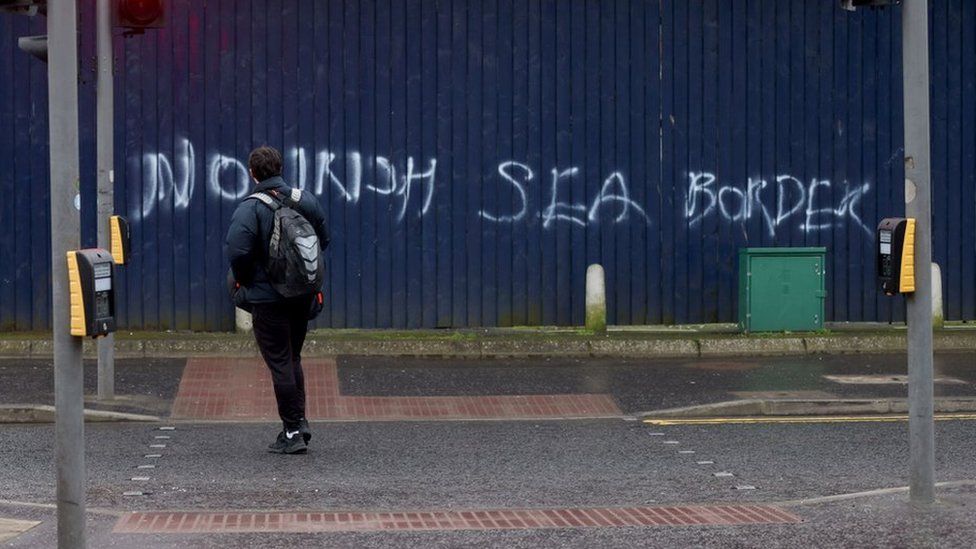Brexit: Arlene Foster says unionism coming together to oppose Protocol
- Published
- comments

There has been a "coming together of unionism" in recent days to oppose the NI Protocol, Arlene Foster has said.
On Tuesday, the DUP published a five-point plan aimed at scrapping the NI part of the Brexit deal.
It called for unity among unionist parties, who say the protocol damages trade and threatens the UK union.
But Sinn Féin has said the protocol must remain in place, insisting there would "always be difficulties" in implementing it.
The protocol was designed to ensure an open border between NI and the Republic of Ireland.
Instead there are checks on some products travelling from Great Britain to Northern Ireland, but unionists oppose this border up the Irish Sea.
Speaking at a news conference on Thursday, Mrs Foster said the "disappointment" for her was that the EU had not acknowledged the protocol was causing disruption to trade between Great Britain and Northern Ireland.
UK and EU leaders met on Wednesday night, following a move by the EU to trigger an emergency mechanism, known as Article 16, to override the protocol amid a row on vaccine exports.
UK 'sleepwalked' into protocol plan
The EU later reversed the decision but faced widespread criticism for the move.
Mrs Foster demanded action be taken by the British government to overturn the current protocol arrangements, and issued a direct message to unionists.
"Part of the difficulty in unionism is that sometimes when confronted with difficult circumstances they turn in on themselves, and start to look for lundys [traitors] they can blame for that," she added.
"But since the actions of the EU last Friday I have seen a coming together of unionism.
"My plea is not to turn in on ourselves."
She said the government had "sleepwalked" into the protocol, and that it should be scrapped before then looking at the risks to the EU's single market.
Mrs Foster said her party wanted people to respond in a calm way, adding: "It's important to focus on constitutional politics."
Speaking on BBC NI's The View on Thursday evening, the first minister said she believed there had been "a shift in emphasis" from the UK government "since the actions of the European Union last Friday".
"Since then we have seen the government respond to the difficulties of the protocol in a more meaningful way," she said.
"No longer are we hearing from government talk about teething problems, we're now hearing them talk about significant problems between Great Britain and Northern Ireland."
Mrs Foster added there was "recognition in government" that action is needed "and it needs to be soon".
The finance minister, Sinn Fein's Conor Murphy, said parties had a responsibility to provide "calm leadership" and ensure businesses could be given advantages through the protocol.
"You can't change trading arrangements without difficulties. Not just unionists are suffering, everyone will in some ways but it can't all be attributed to the protocol," he said.
Mr Murphy argued that some businesses had not prepared fully before the protocol took effect on 1 January, and criticised the British government for "leaving it right to the wire".
Earlier, the Republic of Ireland's foreign minister insisted that the protocol was "not going to be changed.
Simon Coveney said there were problems with implementation, but that the protocol contained "flexibilities".
The UK government has asked the EU for temporary lighter enforcement of the rules to be extended until early 2023.
But the European Commission's chief spokesman said grace periods were always meant to be of a "temporary nature" and were "subject to strict conditions of their application".
Speaking at a daily press briefing, Eric Mamer said it was up to the joint committee involving the UK government and the EU to find a way forward.
Discussions between the UK and EU on managing the protocol are due to continue next week.
It follows the withdrawal of staff from NI ports after threats were issued.
On Thursday, Mr Coveney told BBC News NI there were some "genuine concerns" with the protocol, although his government wanted to be helpful in ensuring its implementation.
"The flexibilities that are already there for Northern Ireland are grace periods for certain elements of the protocol that don't need to be implemented straight away in Northern Ireland, for example supermarkets don't have to have health certifications in order to import products from GB," he outlined.
"We want the protocol to function in a way that works for everybody, north and south on the island of Ireland.
"We talk to and listen to businesses in Northern Ireland as well as south of the border and we want to work with them."
Mr Coveney said the row on Friday over whether the EU would trigger Article 16, which allows an override of the protocol, created more tension.
It will take a few months, he added, "to make sure it can be implemented in full".
'Political football'
Meanwhile, government minister Lord True said Cabinet Office Minister Michael Gove had made it clear to EU Vice-President Maros Sefcovic that their "focus must be on making the Protocol work in the interest of people and businesses in Northern Ireland".
The comments were made during a debate in the House of Lords following an urgent question from Conservative peer Lord Caine.
DUP deputy leader Lord Dodds said the problems around the protocol could only be fixed through "renegotiation or action by the government".
Ulster Unionist peer Lord Empey accused the EU of using Northern Ireland as "political football" and asked what alternatives were being considered for negotiation by the government with the EU.
Lord Caine called on the government to take "robust measures" if both sides fail to agree a solution which protects the Belfast Agreement and respects the integrity of the UK.
- Published2 February
- Published4 February 2021
- Published3 February 2021
- Published3 February 2021